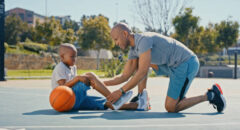
Parenting self-reliant, independent, and kind children may be less difficult than you imagine. Certain activities promote cognitive, social, and emotional abilities, yet they are often disregarded.
Encourage Free Play With Simple Toys
It's wonderful when kids get to play by themselves. Soft skills are developed via play in children. Young children need time to play alone or with others without supervision.
Despite our need for constant socialization and entertainment, adult-led events are not the same as unstructured play. Do not engage in Pinterest-related activities in front of your child, but rather provide them with cardboard boxes, LEGOs, or wooden blocks.
Find Time For Outdoor Play
Getting outside is important for physical and mental development. Being in nature helps develop listening, attention, emotional regulation, and collaboration skills. Playing in natural environments like puddles, mud, rain, snow, and grass provides amazing natural sensory experiences that kids often lack.
Instead of going to a playground, take your kids on a trek or a big open field. Encourage children to explore their environments barefoot, and give them permission to pick up sticks and write notes about what they see.
Allow For Healthy Risk-Taking
Healthy risk-taking as children helps them handle risk as adults. Fear or hostility might result from not taking chances. Children's risk-taking doesn't include life-threatening activities, but more so running fast, whirling and tumbling, rolling down modest slopes, and leaping from heights may be health risks. Anything that causes dread must be handled.
Instead of telling your youngster to "be cautious," take a step back. Letting kids climb the slide, leap off the sofa, or balance on fallen trees builds confidence, resilience, and mental and emotional strength.
Give Kids Time And Space Away From Adults
Older kids need the opportunity and the freedom to play without constant adult supervision. Children need extended periods of time alone to play in order to enter a state of flow.
If you want to give your children some privacy while they play, you might set up a specific area of one room or an entire floor of your home or apartment for that purpose.
Remember that it is the children's responsibility to play, not yours, to provide entertainment for them throughout the day. You may tell them to "Go play!" with full faith in their ability to rise to the occasion.
RELATED: 4 Affordable Activities That Teach Kids About Travel
Involve Children In Your Day-To-Day Life
Kids help naturally. Children love learning practical life skills, aka chores. Incorporating kids into our daily life is crucial because they want to be involved. Doing so offers kids a feeling of responsibility and contributes to the home.
Start early. Give your child a washcloth to mop up a spill, let them put their clothing in the washer and push the button, or get a little vacuum and let them assist.
Practical skills strengthen gross motor abilities. Leaf cleanup, snow shoveling, and laundry basket carrying demand huge muscular groups. Peeling clementines, pouring water from a pitcher, and spreading jam on toast build fine motor abilities.
Don't Be Afraid Of Boredom
Boredom helps youngsters cope with pain and establish their sense of self. By embracing dullness, we teach our kids to generate their own enjoyment without our aid. More downtime lets kids work things out independently, understand what they like, and fosters creativity, independence, and self-reliance.
RELATED: Fun Activities That Will Enhance Your Mental Health
Try to include downtime into your day, or don't bring toys or activities on short car trips, in shop lines, or to restaurants. Start simple and help them develop tolerance—you'll be astounded by their resourcefulness when bored.









